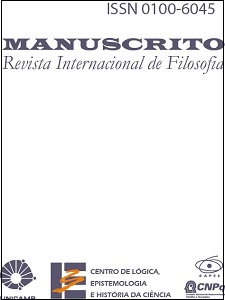Resumo
In this paper I discuss Lotze’s conception of judgement in the framework of his “logic of validity” (Geltungslogik). I first consider Lotze’s influence on the platonic turn of German philosophy of logic. Second, I explain how Lotze tries to overcome the traditional ontological framework by distinguishing between “being” and “validity”. Finally, I discuss Lotze’s conception of judicative content and point out its consequences for the evolution of the doctrine of judgement in neokantianism and phenomenology.
Referências
BEYER, Chr. Von Bolzano zu Husserl. Eine Untersuchung über den Ursprung der phänomenologischen Bedeutungslehre. ordrecht/Boston/London: Kluwer Academic Publisher,1996.
DAHLSTROM, D. O. Das logische Vorurteil. Untersuchungen zur Wahrheitstheorie des frühen Heidegger. Wien: Passagen Verlag, 1994.
ENDERS, M., SZAIF, J. (eds.). Die Geschichte des philosophischen Begriffs der Wahrheit. Berlin: Walter de Gruyter, 2006.
GABRIEL, G. “Frege, Lotze, and The Continental Roots of Early Analytic Philosophy”. In: E.H. Reck (ed.) (2002) pp. 39-51.
KRIJNEN, Chr. “Der Wahrheitsbegriff im Neukantianismus”. In: M. Enders und J. Szaif (eds.) (2006), pp. 287-300.
LEMBECK, K.-H. Platon in Marburg. Platon-Rezeption und Philosophiegeschichtsphilosophie bei Cohen und Natorp. Würzburg: Könnigshausen & Neumann, 1994.
LENK, H. Kritik der logischen Konstanten. Philosophische Begründungen der Urteilsformen vom Idealismus bis zur Gegenwart. Berlin: Walter de Gruyter, 1968.
NESKE, G. (ed.). Erinnerung an Martin Heidegger. Pfullingen: Neske, 1977.
ORTH, E. W. “Dilthey und Lotze. Zur Wandlung des Philosophiebegriffs
im 19. Jahrhundert”. Dilthey-Jahrbuch, 2, pp. 140-158, 1984.
———. “Rudolph Hermann Lotze: Das Ganze unseres Welt- und Selbstverständnisses”. In: J. Speck (ed.) (1986), pp. 9-51.
PICHT, G. “Die Macht des Denkens”. In: G. Neske (ed.). (1977), pp.
-205.
PIERSON, G. N. “Lotze’s concept of value”. The Journal of Value Inquirí,
(2), pp. 115-125, 1988.
RECK, E. H. (ed.). From Frege to Wittgenstein. Perspectives on Early Analytic Philosophy. Oxford: Oxford University Press, 2002.
ROBINS, E. P. [1900]. Lotze’s Theory of Knowledge. Edited by J. E.
Creighton. Whitefish: Kessinger Publisher, 2004.
SANTAYANA, G. [1889]. Lotze’s System of Philosophy. Edited with introduction and references by P. Grimley Kuntz. Bloomington/ London: Indiana University Press, 1971.
SIEBEL, M. “Bolzanos Urteilslehre”. Archiv für Geschichte der Philosophie, 86(1), pp. 56-87, 2004.
SPECK, J. (ed.) Grundprobleme der großen Philosophen. Philosophie der Neuzeit. Bd. 4: Lotze/Dilthey/Meinong/Troeltsch/Husserl/Simmel. Göttingen: Vandenhoeck & Ruprecht, 1986.
VIGO, A. G. “Intuición categorial”. Thémata, 28, pp. 187-212, 2002.
———. “Sinn, Wahrheit und Geltung. Zu Heideggers Dekonstruktion der intensionalistischen Urteilslehre”. Archiv für Geschichte der Philosophie, 86(2), pp. 176-208, 2004.
———. “Juicio y modalidad en Husserl. La evolución de la teoría del juicio y el contenido judicativo de Vorlesungen über Bedeutungslehre hasta Ideen I”. Anuario Filosófico, 37(1), pp. 157-195, 2004a.
———. “La recuperación crítica de la pregunta por el ser en Heidegger”.
Signos Filosóficos, VIII(15), pp. 65-104, 2006.

